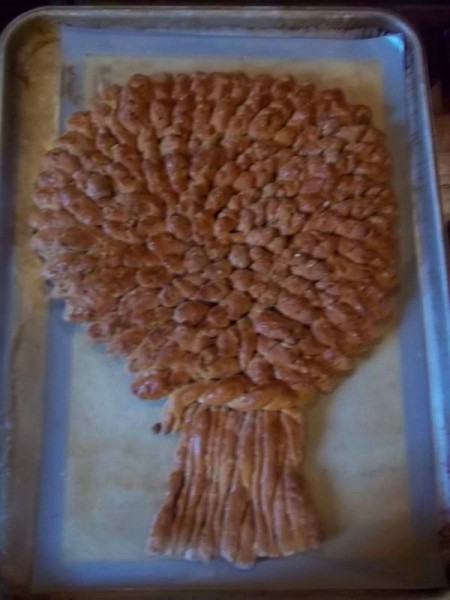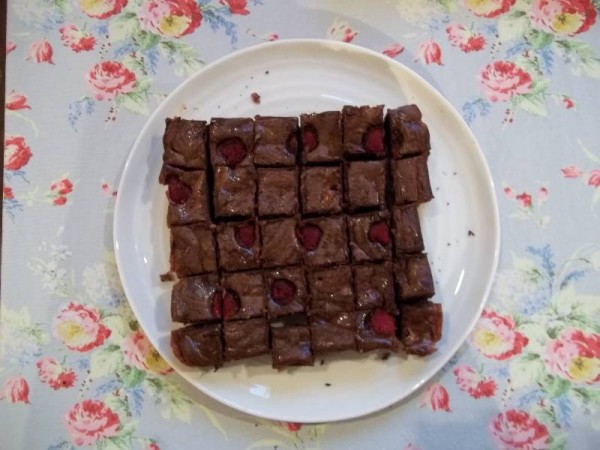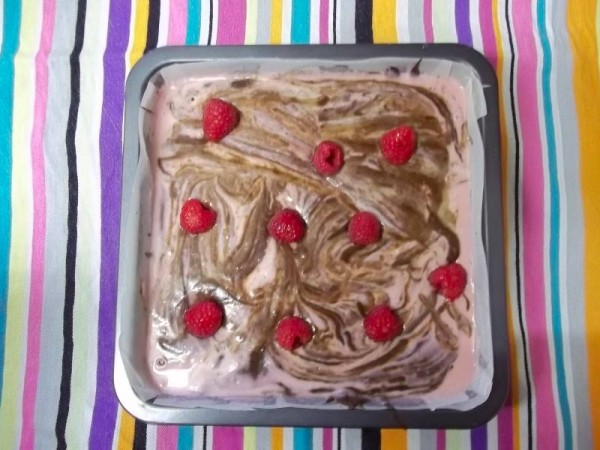Torrential rain, inadequate umbrellas and the sort of cold that creeps into you from the feet up set the scene for the Sunday morning Harvest Festival in our church down by the banks of the Thames. Farm machinery lies inactive in the barns and farmyards and the local farmer strolls into church looking smart and spruce with time to spare – no last minute dash from the field for him now it’s early October. A splendid harvest loaf has been baked by a generous couple from Wallingford who wish to get married in the church and who are coming to services on a regular basis. The loaf, shaped like the concertina fan of sheafed wheat, propped up on the altar, is a focal presence throughout the service. At the end it is torn up and passed around so that it can be admired for taste (nutty and malty wholemeal and bran) as well as for its good looks. The raspberry ripple cheesecake brownies daughter no.3 baked seem extreme decadence in contrast but both are well received by cold hands and lunch-yearning tummies whose owners delay spilling out of the church and into the rain for the soggy walk/drive home. (There were about 60 in the congregation, about 8 of whom were children.)
Recently green plastic boxes for collecting groceries have become a regular sight in the team’s churches, which being open all day are an easy place to bring food (mainly dried and tinned). One set of village grandparents take their grandchildren to the local supermarket and give each of the three of them £5 to spend on goods to go into the green box, When filled, the boxes go to Reading for distribution to families in the city who are finding themselves in financially perilous situations. This year’s produce and the collection was to go to ‘Readifood’ and a volunteer spoke briefly about their work, emphasising how even a small contribution of say a couple of tins of soup/beans and a packet of biscuits a week helped make a difference. Those released from prison no longer have a cash handout and a food parcel for a few weeks can help diminish their risk of immediate re-offence. At the moment 100 families are helped every week in Reading through this scheme. Having it explained in this way, the small scale and lack of pushiness of this operation appealed to me and made me ashamed to think how little attention I’ve paid the green boxes (and especially in helping to fill them).
This delicious recipe is a cross between a cheesecake and chocolate brownies and is really something – velvety raspberry cheesecakiness meanders through the more robust chocolatiness of a deeper pile to a very delicious effect. People swoon when they taste it. V. good with blueberries too.
Recipe by Melanie Johnson from Country Life July 24 2013
Ingredients
100 g raspberries
1 tbsp. sugar
200 g cream cheese
50 g caster sugar
1 egg yolk
200g 70% cocoa chocolate
185 g butter
3 eggs
200g caster sugar
115 g plain flour
Put 100g raspberries and 1 tbsp of sugar in a pan and heat until the juices run. Pass the fruit pulp through a sieve on to the cream cheese, caster sugar and the egg yolk. Mix well and set aside.
Melt the chocolate with the butter above a low heat. Meanwhile whisk 3 eggs and 200g caster sugar until fluffy. Now pour the melted chocolate and butter over the eggs and sugar and mix well. Add the plain flour. Pour the mixture into a lined 8″ x 8″ (20cm x 20cm) brownie tin. Dot spoonfuls of the cream cheese and raspberry mixture on to the brownie mix before swirling a skewer through it to create a marbled effect. Scatter with a few fresh raspberries. (We put a layer of brownie mix, then cheesecake mix, then brownie mix, then cheescake mix and then swirled that. More fresh raspberries would not go amiss.)
Bake 180 degrees C/350 degrees F/Gas mark 3 for about 45 minutes.
Cool and slice
Addendum 17 October 2013: I was going to mention my quite by chance topical reading of Jim Crace’s ‘Harvest’ when our phone line and broadband connections went down. (We all now know that, though shortlisted, he failed to win the Man Booker prize announced earlier in the week.) In many ways this stunningly written book represents much that is good about and equally much that is bad about the Man Booker. The language sparkles with unthought of metaphors and similes, the story is fiction yet well rooted in history (it informs as well as entertains) and yet I came to the end feeling the book was a bit of a one trick pony.
The grain harvest has been “frugal in the ear” but over pagan middle England, deep in a rural way of life forged over centuries, looms the darker cloud of the enclosure of common land. An absentee landlord descends to throw over the old village life and to forge a new one in which mechanical innovation in the pursuit of progress, but above all profit will push cottagers off their bits of land, out of their homes and into highways and byways in search of work. Sheep will take the place of the sheaf and machines will reduce the hired hands.
A heady mix of events – youths made reckless on potent mushrooms, interloping economic migrants from the domino trail of enclosed land elsewhere and misconceived allegations of witchcraft – accelerates the inevitable conflagration and the inexorable and predictable conclusion which is itself the weakest part of the book. Strangely pertinent both local (what is bedroom tax but a form of enforced enclosure? ) and global (the destruction of the Amazon rain forest for beef cattle), there is much food for thought in this timeless fable.
But it is Crace’s ability to use language in such a way that words glow with new images. The village population are “as tense and volatile as wasps”. When a man is knocked over in a skirmish, he describes himself as being ” fallowed by the cottagers” and later, “I am furrowed to see the village back away from me”. Air is “stewed”, while a midnight storm appears to be “enamelling” puddles. Glorious language and a story that for all its shortcomings should raise our awareness of the dangers of Procrustean change imposed from outside and above.




6 Comments
Beautiful as usual. A real joy to read and enjoy your posts, especially on harvest. Thank you. God bless. x
Claire,
Both David and I enjoy your posts (and have just ended up sitting down to talk about the moral problems you mention here http://parttimepriest.blogspot.co.uk/2013/10/the-view-from-somewhere.html). Your blog must be a joy to anyone with as many commitments as you have which is in large part due to the phase of life you’re in – family life (food provision, teenage children being teenagers, let alone doing stressful exams, your eldest at university, etc.), a so-called part-time job which is as long as apiece of string and the rest of life (I’m sure I should have fitted in your husband somewhere too. Apologies to him.) It is a great read – very honest, informative and amusing . Mary
I so enjoy your blog; I’m a Presbyterian minister’s wife. I bake a challah bread loaf for our communion service once a month, so I’m fascinated with the sheaf of wheat bread. How did they do that?
Claudia, thank you for your kind comment. I know the bread makers made a base and then made little fish shapes and stuck them on the base with a dab of water – it was very time consuming. This was in face the second they had made as they were not so satisfied with the taste of the first (though they brought the first too and it looked fine). Such seeking after perfection.Your communion bread sounds very impressive. Mary
So lovely to see you made ny recipe for raspberry ripple cheesecake brownies that were in Country Life! I do hope you are still reading my column! Your blog is an inspiration….
Your raspberry ripple cheesecake brownie is amazing – we make it when we want something really special.
I’ve been looking at your online recipes and at the moment, with snow on the ground, your vegetable recipes (roast swede with thyme and pecorino, Brussels sprouts stirred into macaroni cheese ) sound very enticing. You always find a nice little twist to make things a bit different.
Thank you for being so nice about my blog.